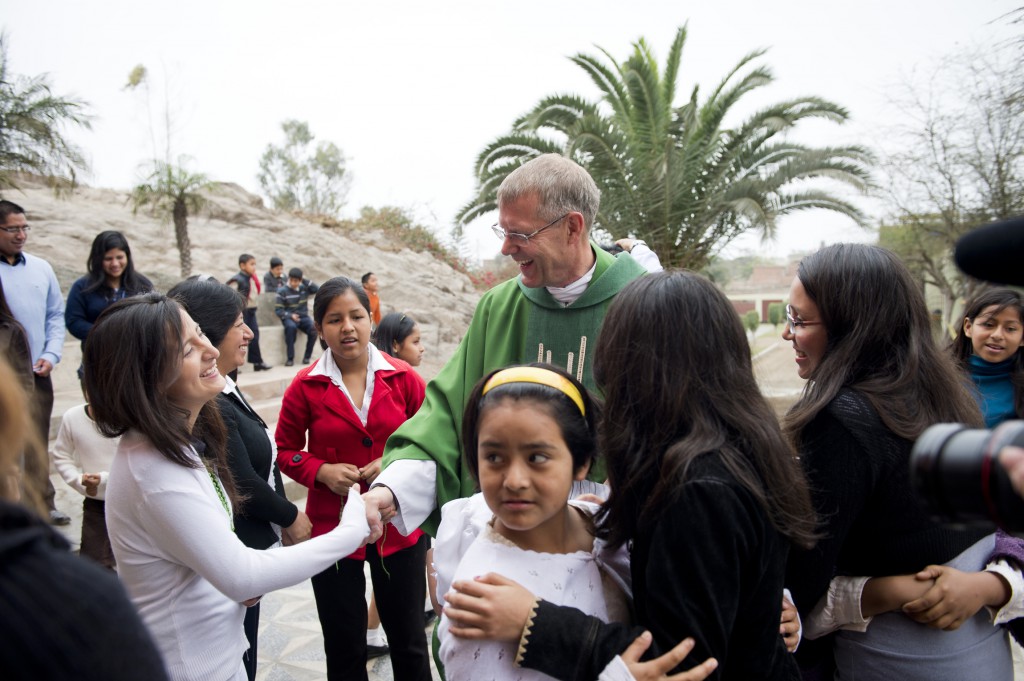
By Ellie Gardner
In 1975, Msgr. Joseph Hirsch spent a month living in Lima’s slums as he backpacked through South America. Now he’s back in Peru, working to prove a man he met that year is a saint.
But proving a man is a saint is no easy job, and it will take years of interviews, investigation, paperwork and prayer.
Father Joseph Walijewski from the Diocese of La Crosse, Wis., diocese died in Peru in 2006, after 35 years of serving the country’s poor. On March 19, his sainthood cause was launched in La Crosse.
“Even if it takes 200 years to canonize him, I think his story is something that can impact us today,” said Msgr. Hirsch, who is also from the La Crosse Diocese.
When young Msgr. Hirsch met Father Walijewski, the older priest was working in Villa El Salvador, a Lima slum. He dreamed of starting an orphanage to help the abandoned and abused children he saw daily.
In 1985, Blessed John Paul II visited Villa El Salvador. Father Walijewski shared his dream with the pope, who donated $50,000. Father Walijewski named the orphanage Casa Hogar Juan Pablo II.
The orphanage started with two children, one volunteer and one tutor. Today, Casa Hogar is home to 64 children. They live in a family style modeled after the Boys Town program. The children are divided into eight families, each with their own apartment, mother and father.
Alfredo Inigo, 21, moved to Casa Hogar when he was 8. He said Father Walijewski taught him friendship and kindness that he had never known in his own home. He lived there until he turned 18 and said he still prays to Father Walijewski.
“He was a very humble priest,” Inigo said.
When asked what Father Walijewski was like, almost everyone mentioned this humbleness. They smiled and laughed, remembering his broken Spanish.
“He almost always spoke in the present tense,” Msgr. Hirsch said.
They also talked about his childlike nature and love of singing. One of his favorite tunes was Old McDonald, and he had perfected the sounds of each animal.
And no one could pronounce his last name. Father Walijewski would joke and tell them to call him “Padre Whiskey.”
Father Walijewski considered the orphanage his greatest work.
“The vision is to be able to transform society by teaching children how to live in families,” said Msgr. Hirsch. “The transformation of a culture happens always within marriage and within the family.”
In July, Msgr. Hirsch took over as executive director of Casa Hogar. He now lives in the house where Father Walijewski once lived.
Msgr. Hirsch said he had dreamed of working as a missionary in Latin America since his high school days. He was ordained in 1986 and patiently waited to be sent to the missions. In the meantime, he led a handful of short mission trips to Casa Hogar. Finally, in 2013, he received his first post abroad, at Holy Cross Parish in Bolivia, a church started by Father Walijewski.
Just five months later, Msgr. Hirsch was sent to Peru, tracing the footsteps of his friend.
In addition to directing Casa Hogar, Msgr. Hirsch was appointed the promoter of justice in the cause of Father Walijewski. He will spend the next five years gathering testimony. One of the first interviews he conducted was about 600 questions long and lasted six hours.
“I look at this as an opportunity to be able to learn not just the life but the spirituality of a very simple and holy priest who gave himself completely,” Msgr. Hirsch said.
Father Walijewski is buried in the hillside overlooking Casa Hogar and the sea. Every Sunday, Msgr. Hirsch takes the families up there to pray. They touch the grave and ask questions about Father Walijewski; some of the younger children never met him. Msgr. Hirsch said he hopes through his stories of Father Walijewski, he can keep his presence alive at Casa Hogar.
Thousands attended Father Walijewski’s funeral in Villa El Salvador. There, Msgr. Hirsch asked several people what it was like to know the priest.
Many told him, “This is the first saint that I’ve ever met.” – CNS